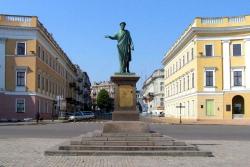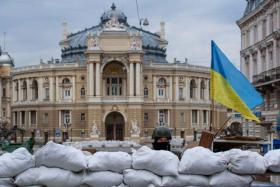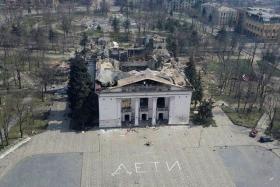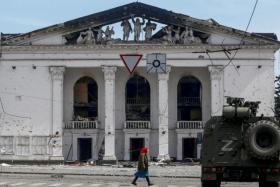Odesa in Ukraine
 Greece's Foreign Affairs Ministry welcomed the World Heritage Committee's decision on Wednesday 25th January 2023 to inscribe the Historic Centre of the city of Odesa*, in Ukraine, on the UNESCO World Heritage List. This decision is a successful outcome of coordinated efforts, in which Greece took the lead in coordination with Belgium, Bulgaria, Italy and Japan, in order to immediately respond to Ukraine's request for the city's protection, especially under the current war conditions in the region. The historic centre of Odesa has also been inscribed on the List of World Heritage in Danger, which could provide Ukraine with extra technical and financial international assistance for its protection, but also for its repair in the event of damages caused by Putin's Russian invasion.
Greece's Foreign Affairs Ministry welcomed the World Heritage Committee's decision on Wednesday 25th January 2023 to inscribe the Historic Centre of the city of Odesa*, in Ukraine, on the UNESCO World Heritage List. This decision is a successful outcome of coordinated efforts, in which Greece took the lead in coordination with Belgium, Bulgaria, Italy and Japan, in order to immediately respond to Ukraine's request for the city's protection, especially under the current war conditions in the region. The historic centre of Odesa has also been inscribed on the List of World Heritage in Danger, which could provide Ukraine with extra technical and financial international assistance for its protection, but also for its repair in the event of damages caused by Putin's Russian invasion.

In a recent visit to Odesa, Greek Foreign Minister Nikos Dedias vowed to make the city a World Heritage monument, as Odesa is linked to Greece, because in the early 1820s this is where the Greek Revolution began. The Filiki Eteria Museum in Odesa is a beacon of Hellenism, housed in the very place where the Greek War of Independence was conceived and planned. The former Kresnij Pereulok Street home of Greek businessman and national benefactor, Grigorisos Maraslis, the Mayor of Odesa between 1878 and 1895, was where the Filiki Eteria (Society of Friends) secret society hatched the plans that would come to fruition in the Greek Revolution. Greece is also linked to Odesa by its Opera and Ballet Theatre (photo above) which was rebuilt when the city's Mayor was Grigorios Maraslis.
 During the southern Ukraine offensive of the 2022 Russian invasion of Ukraine, the city of Odesa and the surrounding region have been the target of shelling, cruise missiles and air strikes by Russian forces on multiple occasions since the war began, mostly fired from Russian warships situated offshore in the Black Sea. Odesa has enormous tactical, symbolic and economic significance, as the fate of the Ukrainian port will determine the severity of a growing food crisis. Known as the 'pearl by the sea', Ukraine's third largest city was once the jewel of the old Russian Empire that President Putin dreams of resurrecting.
During the southern Ukraine offensive of the 2022 Russian invasion of Ukraine, the city of Odesa and the surrounding region have been the target of shelling, cruise missiles and air strikes by Russian forces on multiple occasions since the war began, mostly fired from Russian warships situated offshore in the Black Sea. Odesa has enormous tactical, symbolic and economic significance, as the fate of the Ukrainian port will determine the severity of a growing food crisis. Known as the 'pearl by the sea', Ukraine's third largest city was once the jewel of the old Russian Empire that President Putin dreams of resurrecting.
*The historic southern Ukrainian city and port is known as ODESA in Ukrainian - ODESSA in Russian - ODESSOS in Greek. All can be used in English.



At the onset of the Russian invasion of Ukraine, the Donetsk Regional Drama Theatre in Mariupol was totally destroyed by the Russian airforce on 16th March 2022. Russian warplanes dropped two 500kg bombs on the theatre which sheltered 1200 Ukrainian civilians that were using the theatre as an air-raid shelter. At least 300 men, women and children were killed in this airstrike, despite a large sign saying 'Children' in Russian next to the theatre. The Mayor of Mariupol estimated that approximately 85% of the city was destroyed due to Russian shelling. In July 2022 the occupying Russian forces started to clear the rubble from inside the theatre, to destroy all evidence of their bombing and conceal their war crime. The bodies of the trapped victims were taken away to an unknown place. The total demolition and clearance of the Mariupol Drama Theatre continues to this day.


